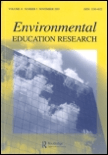
Environmental Education Research
Scope & Guideline
Elevating Environmental Awareness through Education
Introduction
Aims and Scopes
- Interdisciplinary Approaches to Environmental Education:
The journal promotes research that bridges various disciplines, incorporating insights from social sciences, humanities, and natural sciences to enrich environmental education practices. - Focus on Climate Change Education:
A significant emphasis is placed on educating about climate change, including its impacts, mitigation strategies, and fostering resilience among learners, particularly youth. - Promoting Environmental Literacy and Action Competence:
The journal aims to enhance understanding of environmental literacy, encouraging learners to develop competencies necessary for proactive environmental stewardship and sustainable practices. - Engagement with Local and Global Contexts:
Research published in the journal often addresses both local environmental challenges and global sustainability goals, fostering a sense of responsibility and connection among learners to their community and the world. - Innovative Pedagogical Practices:
The journal highlights creative and effective teaching methods, including outdoor and experiential learning, that engage students in meaningful ways with environmental issues. - Critical Perspectives on Sustainability:
The journal encourages critical reflections on sustainability concepts, exploring the socio-political dimensions of environmental education and its implications for equity and justice.
Trending and Emerging
- Youth Activism and Climate Justice Education:
Recent publications increasingly focus on youth engagement in climate activism, emphasizing the role of education in empowering young people to advocate for environmental justice and sustainable futures. - Integration of Technology in Environmental Education:
Emerging themes include the use of digital tools and virtual learning environments to enhance environmental education, particularly in light of the COVID-19 pandemic. - Community-Based and Place-Based Education:
There is a growing emphasis on community engagement and place-based education, which connects learners to local environmental issues and encourages active participation in sustainability initiatives. - Critical Pedagogy and Transformative Learning:
Research is increasingly exploring critical pedagogical approaches that challenge traditional narratives around sustainability, promoting reflection and transformation among learners. - Focus on Emotional and Psychological Dimensions:
A trend towards examining the emotional and psychological aspects of environmental education, including eco-anxiety and emotional resilience, is becoming more prominent, recognizing the impact of emotions on environmental engagement.
Declining or Waning
- Traditional Environmental Education Methods:
There appears to be a waning focus on conventional environmental education strategies that do not incorporate experiential or critical pedagogical approaches. - Overemphasis on Knowledge Transmission:
Research that primarily emphasizes the transmission of environmental knowledge without fostering critical thinking or action-oriented outcomes is decreasing, as the field shifts towards more participatory and engaged learning approaches. - Single-Discipline Studies:
There is a declining interest in studies that isolate environmental education within a single discipline, as interdisciplinary approaches are increasingly recognized as vital for addressing complex environmental challenges. - Neglect of Socio-Emotional Factors:
Themes related to the socio-emotional aspects of environmental education, such as eco-anxiety or emotional engagement, are less frequently explored compared to more action-oriented or knowledge-based research.
Similar Journals
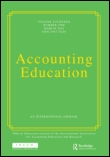
Accounting Education
Advancing Knowledge, Shaping Future AccountantsAccounting Education is a leading academic journal dedicated to advancing the field of accounting education, published by Routledge Journals, Taylor & Francis Ltd. With an impressive Q1 ranking in both the fields of Accounting and Education, the journal serves as a vital platform for educators, researchers, and practitioners interested in the evolving pedagogies and methodologies in accounting education. The journal’s focus is on disseminating high-quality research that addresses contemporary challenges and innovations within accounting teaching, supported by an extensive archive from 1992 to the present. While currently not open access, the journal is known for its rigorous peer-review process, ensuring that only the most impactful research is published. With its high Scopus rankings, including a notable 92nd percentile in Business, Management and Accounting, Accounting Education provides invaluable insights and fosters professional development, making it an essential resource for anyone committed to enhancing accounting education.

Revista Brasileira de Educacao do Campo-Brazilian Journal of Rural Education
Advancing equitable education for rural communities.Revista Brasileira de Educação do Campo - Brazilian Journal of Rural Education, published by Universidade Federal de Tocantins (UFT) since 2016, is a distinguished open access journal aimed at advancing research and scholarship in the field of rural education. With its commitment to enhancing educational practices and policies in rural settings, this journal serves as a vital platform for researchers, educators, and policymakers to share their findings and innovations. By embracing a diverse range of interdisciplinary perspectives, the journal seeks to address the unique challenges and opportunities faced by rural educators in Brazil and beyond. The journal's dedication to open access ensures that the knowledge produced is widely disseminated, fostering a rich dialogue within the educational community. As the field of education continues to evolve, Revista Brasileira de Educação do Campo stands at the forefront, championing the importance of equitable and inclusive education for all learners.
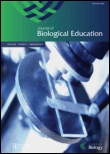
JOURNAL OF BIOLOGICAL EDUCATION
Fostering Excellence in Biological Education WorldwideThe JOURNAL OF BIOLOGICAL EDUCATION is a prominent academic journal published by Routledge Journals, Taylor & Francis Ltd, focusing on innovative research and practices in the field of biological education. With an ISSN of 0021-9266 and E-ISSN 2157-6009, this journal serves as a vital resource for educators, researchers, and students dedicated to enhancing the teaching and learning of biology. Since its inception in 1967, it has maintained a consistent commitment to promoting best practices and integrating new methodologies into biological curriculum design and pedagogy. The journal holds a respectable impact factor and ranks in the Q2 category for both Agricultural and Biological Sciences and Education, reflecting its influence and authority within these fields. Researchers are encouraged to engage with its diverse range of articles that address critical issues in biological education, showcasing cutting-edge research and practical approaches. Its reach is particularly significant in the United Kingdom and globally, making it a key platform for disseminating knowledge and fostering collaboration among professionals.

Journal of Outdoor and Environmental Education
Transforming Education Through Outdoor ExperiencesJournal of Outdoor and Environmental Education, published by SPRINGERNATURE, stands as a significant platform for interdisciplinary research in the realms of education and health professions, focusing particularly on the integration of environmental and outdoor contexts into educational practices and therapeutic interventions. With an ISSN of 2206-3110 and an E-ISSN of 2522-879X, this academically rigorous journal aims to foster a greater understanding of how outdoor experiences can influence learning outcomes and enhance well-being. It holds a commendable ranking in the 2023 Scopus categories—positioned in the Q3 quartile within both Education and Physical Therapy, Sports Therapy, and Rehabilitation. Operating from its base in Switzerland, the journal emphasizes accessibility, striving to offer an open platform for contributions that inform educators, therapists, and researchers alike. With a convergence of perspectives from 2016 to 2024, the Journal of Outdoor and Environmental Education plays a pivotal role in advancing discourse and innovation in outdoor education practices and their implications for health and physical activity.
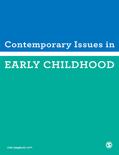
Contemporary Issues in Early Childhood
Pioneering Research for Tomorrow's EducatorsContemporary Issues in Early Childhood is a leading academic journal published by SAGE Publications Ltd, dedicated to advancing the field of early childhood education and developmental psychology. With an ISSN of 1463-9491, this journal serves as a vital platform for disseminating research that addresses both pressing and emerging challenges in early childhood contexts. It has established itself within the academic community, currently ranked in the Q3 category for Developmental and Educational Psychology and Q2 for Education, reflecting its significant contribution to the field. The journal's robust scholarly output, indexed in Scopus, underscores its essential role, ranking 623rd out of 1543 in Social Sciences Education and 198th out of 360 in Developmental and Educational Psychology. By offering critical insights and fostering discussions among researchers, educators, and practitioners, Contemporary Issues in Early Childhood remains an invaluable resource for those committed to enhancing early childhood practices and policies, influencing both theory and application in the United Kingdom and beyond.

REMEA-Revista Eletronica do Mestrado em Educacao Ambiental
Empowering Environmental Education Through Research.REMEA-Revista Eletronica do Mestrado em Educacao Ambiental, with ISSN 2318-4884 and E-ISSN 1517-1256, is an esteemed academic journal published by the Federal University of Rio Grande, Institute of Education, Brazil. This journal serves as a vital platform for disseminating research in the interdisciplinary field of environmental education. With a commitment to open-access publishing, REMEA aims to bridge the gap between theory and practice, fostering dialogue among educators, researchers, and practitioners who are dedicated to promoting environmental awareness and sustainability. Its mission encompasses a diverse range of topics, including pedagogical approaches, curriculum development, and innovative methodologies in environmental education. By providing a forum for high-quality research and critical analysis, REMEA significantly contributes to the evolution of best practices in environmental education, making it an essential resource for professionals and students alike seeking to enhance their knowledge and impact in this dynamic field.
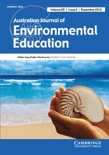
Australian Journal of Environmental Education
Nurturing a legacy of impactful environmental learning.The Australian Journal of Environmental Education, published by Cambridge University Press, stands as a pivotal source of scholarly research and discourse in the fields of environmental education and sustainability. With an ISSN of 0814-0626 and an E-ISSN of 2049-775X, this quarterly journal has been contributing to the academic landscape since its inception in 1984, demonstrating a robust legacy through its convergence years up to 2024. Recognized for its impact, the journal holds a commendable position in the Q2 quartile for both Education and Environmental Science categories as of 2023. With Scopus rankings placing it at #614 in Social Sciences (Education) and #123 in Environmental Science (General Environmental Science), it is well-positioned to inform and shape environmental education practices and research globally. Though currently not open access, the journal provides critical insights and pedagogical approaches essential for educators, researchers, and policy-makers dedicated to fostering environmental stewardship among learners. As the discourse surrounding climate change and ecological awareness deepens, the Australian Journal of Environmental Education remains a vital resource for those committed to advancing education that acknowledges and addresses these pressing global challenges.

Revista Conrado
Illuminating diverse perspectives in social sciences.Revista Conrado, an esteemed academic journal published by UNIV CIENFUEGOS, specializes in a broad spectrum of topics within the field of education, social science, and cultural studies. With its commitment to Open Access publishing since 2012, the journal not only enhances the visibility of research but also fosters the dissemination of knowledge globally. Based in the vibrant city of Cienfuegos, Cuba, this journal aims to provide a platform for scholars, practitioners, and students to share original research findings, reviews, and insights that contribute to the advancement of their disciplines. As it continues to grow in both reputation and impact, Revista Conrado plays a pivotal role in nurturing scholarly dialogue and collaboration across international academic communities.

REDHECS-Revista Electronica de Humanidades Educacion y Comunicacion Social
Connecting Scholars to Transform Education and SocietyREDHECS-Revista Electronica de Humanidades Educacion y Comunicacion Social is a pivotal journal specializing in the interdisciplinary fields of humanities, education, and social communication. Published by UNIV PRIVADA DR RAFAEL BELLOSO CHACIN-URBE in Maracaibo, Venezuela, this journal serves as a vital platform for scholars and practitioners seeking to explore and disseminate innovative research and contemporary discussions relevant to these fields. Although not indexed in Scopus, the journal emphasizes rigorous peer-reviewed scholarship and provides an open-access model, making research widely available to a global audience. With a commitment to fostering dialogue and collaboration among researchers, educators, and students, REDHECS plays a crucial role in promoting advancements in humanistic education and social communication, thus enriching both academic and practical knowledge.
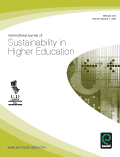
International Journal of Sustainability in Higher Education
Exploring pathways to responsible education.International Journal of Sustainability in Higher Education, published by Emerald Group Publishing Ltd, is a leading academic journal dedicated to the exploration of sustainability within higher education settings. Established in 2000, this prestigious journal has garnered a reputation for excellence, reflected in its Q1 ranking in both Education and Human Factors and Ergonomics, and securing a prominent place in the Scopus database—ranked #152 out of 1543 in the Social Sciences Education category. With a focus on innovative research and practices that promote sustainable development in educational institutions, this journal aims to provide a comprehensive platform for academics, practitioners, and policymakers to share insights and advance knowledge in this critical area. While it is not currently an open access publication, the journal's continued contribution to the sustainability discourse makes it an invaluable resource for anyone dedicated to fostering responsible and sustainable higher education practices.